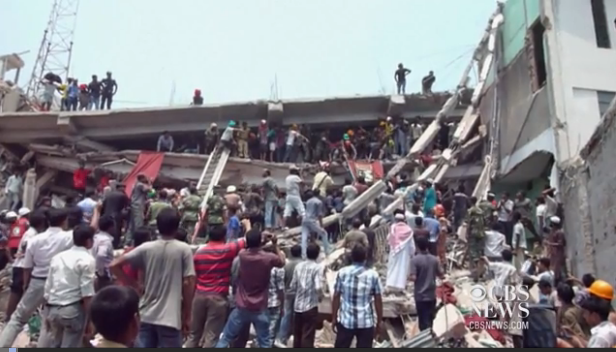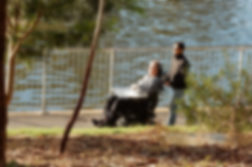Today marks two years since Rana Plaza came crashing down, killing more than 1100 Bangladeshis and grievously injuring more than 2000.
Most of the dead were garment workers from the five upper-storey factories that supplied major global brands out of the building, which had started to show dangerous cracks in the third floor pillar the day before.
On April 23, a government inspector sent the workers home, predicting the tragedy, but the next morning factory managers threatened and cajoled them back in to the building.
Those who refused were threatened with dismissal. For Bangladeshi garment workers, who can be fired on a whim, and often suffer beatings, verbal abuse and intimidation, it was difficult to say no.
They returned to the job and within an hour many of them were dead. Others would be dragged out of the debris days later.
From the rubble of the disaster came some improvements to Bangladeshi labour laws, brought about by the increased international scrutiny which followed.
By the end of 2013 the government had raised the minimum wage from US$39/month, to US$68. Still lower than international standards, and less than workers had demanded, it was obviously a substantial hike.
More vitally, though, the government passed laws to make it easier to join a trade union, bringing the constitutionally recognised right closer to many of the 4 million people who work in Bangladesh’s more than 4,500 garment factories.
Trade unionism is recognised as the key to fixing the serious and systematic abuses of garment workers’ rights internationally, and by the ironers and fabric cutters who bring the western world cheap, disposable fashions.
But for them, organising is not easy.
A new Human Rights Watch report, released earlier this week, details violent suppression of the Bangladesh’s burgeoning trade union movement which factory owners see as a threat the nation’s position as the second biggest garments manufacturer.
The report is littered with accounts of violent extortion.

One man, identified as Basak, who was acting as President of one of Bangladesh’s workplace-based trade unions, explains what happened one night waiting for a bus outside the factory where he and his wife work:
“Four people were holding me and beating me on the legs with bars, and two people were beating her with iron bars.
“She was beaten on her head and on her back. Her arms were severely injured and bleeding. Bones of one of her fingers were broken.
“She had to get 14 stitches on her head. When they were beating up Mira, they were saying ‘You want to do union activities? Then we will shower you with blood.”
The report details how workers are often underpaid or not paid at all, forced to sign blank pieces of paper, slapped and sworn at by factory managers, and quite frequently beaten.
In spite of the abuses, it’s an industry that has been key to lifting millions of Bangladeshis, typically rural women, out of poverty. The sector has gone from being worth US$31.5 million and employing 120,000 workers in 1983-4 to four million workers and US$24 billion in 2013-4. It represents eighty per cent of the country’s exports and accounts for more than 10 per cent of GDP.
Factory owners say they’re being squeezed by western companies to produce garments at rock bottom prices, and they can’t afford to operate safe factories, but workers are increasingly demanding a better deal.
In 2013, the year of the Rana Plaza disaster, 85 new unions registered. In 2014, 174 more followed, and in the first three months of 2015, 21 new unions were established. It’s a massive increase on the two union registrations of 2011 and 2012, but even so, unions are still present in less than 10 per cent of factories.
As the report title indicates, “whoever raises their head suffers most”.
Since Rana Plaza, the government has made it easier to form a union, streamlining the process for registration, and big brands have been forced in to greater transparency about where their clothes are manufactured, but it hasn’t stopped the union busting.
Sometimes the factor owners simply fire union members in the hundreds, and quite probably blacklist them so they can’t find work elsewhere, but factory owners will also hire local thugs, or “mastans”, to attack workers who attempt to unionise.
“They were trying to force me to tell the names of all the other persons in the union and in other factories,” one union organiser told Human Rights Watch, “and also how many workers were organisers and members of the federation”.
“Those thugs said that factory owners have a lot of money. They said they were ordered to beat me so badly that I would be covered with soil.
“They hit me with field hockey sticks, fractured my right leg, and beat me on the arms, shoulders, and back. Really my entire body was covered with injuries.
“One thug yelled at me that if he heard me speak the name of the NGWF [an umbrella union]in the future, he would cut out my tongue.”
According to the report, the problem is widespread, and appalling conditions are “the product of continuing government failures to enforce labor rights, hold violators accountable, and ensure that affected workers have access to appropriate remedies”.
The laws offer theoretical protection, but it’s the collective power of workers in an industry plagued by labour shortages that will bring long term gains.
Tragedies like the collapse of Rana Plaza are not isolated, and haven’t stopped. Fire is the greatest risk, and many of the Rana Plaza victims are still waiting on adequate compensation.
The report’s recommendations to government seem obvious: enforce the existing laws, bring them in to line with international labour standards, hire more inspectors, deal with complaints thoroughly and quickly, strengthen sexual harassment laws, name and shame non-compliant factories.
Human Rights Watch also made recommendations to the ILO, foreign retailers, and Bangladesh’s employer lobby.
What’s striking about the report, though, is that it reveals the defiance of Bangladeshi garment workers, who are continuing to organise for better pay and conditions in spite of the very real risks.
Donate To New Matilda
New Matilda is a small, independent media outlet. We survive through reader contributions, and never losing a lawsuit. If you got something from this article, giving something back helps us to continue speaking truth to power. Every little bit counts.



